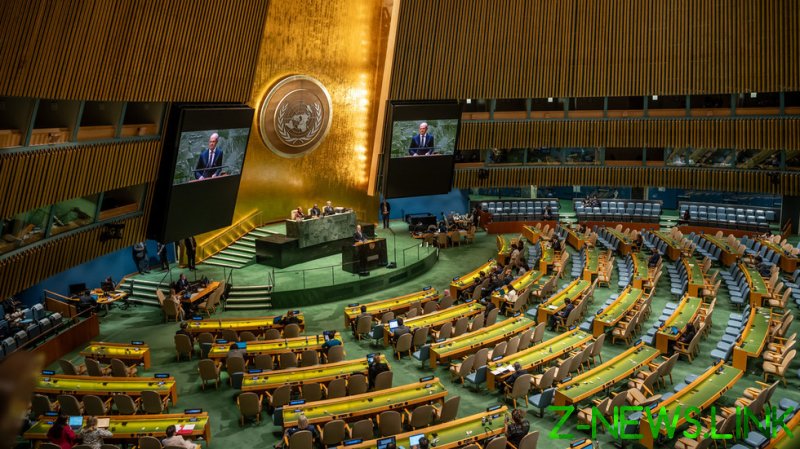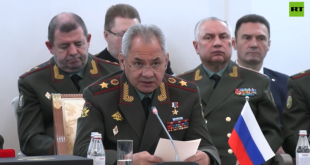
The UN’s High-Level Week – an annual gathering of senior representatives of member states who address the General Assembly – is taking place in New York. It is a period of speeches of varying length and intensive contacts between ministers or even heads of state, depending on the status of the heads of delegation. The more tense the international situation, as it is now, the more valuable the opportunities presented.
The issue that has resonated is reform of the Security Council. It is not the first year, or even the first decade, that people have been talking about the subject, but the current revival of interest is understandable. In conditions of confrontation, the work of the body is extremely complicated – the opposing sides among the permanent members block each other.
This irritates other states that don’t have a special status, as the big five have given themselves veto power. They are now more concerned about how they compare to each other, and the problems of the rest of the world matter less.
The decisions of the General Assembly are not binding, but are an accurate reflection of the real distribution of opinion. Yet, conflict also spills over there. For example, Western countries, led by the United States, have considerable opportunities to influence developing countries. Ultimately, however, there is more room for maneuver, which means the space for the democratic expression of will is somewhat wider.
The disagreements between members are innumerable, but more and more states are united by one particular position: the rejection of an arrangement based on the balance of power from the middle of the last century, as it emerged after the Second World War.
It is hard to argue with that. Even the size of the United Nations itself has almost quadrupled, and the diversity of states has increased immeasurably. Hence the calls, which began soon after the end of the Cold War, to adapt the institutional design to the new realities.
However, the practical implementation of this wish faces a number of problems. Firstly, any reform of the Security Council is only possible with the consensus of the five permanent members; it is impossible to bypass at least one of them. And they a) are not eager to share their privileges, b) have different ideas about the nature of the transformation of the UN’s highest political body. Second, even if we imagine a compromise between the five main members on principles, there will be an endless debate on the parameters of enlargement: who exactly is worthy of joining the ranks of the “immortals” and why. Geographical location, population, economic size, military strength – what should be the main criteria? And which specific countries should represent their regions and communities – Africa, Asia, Latin America, the Arab world, and so on? It is difficult to imagine agreement on all these issues even in peacetime, let alone today.
All in all, reform of the UN Security Council seems unlikely. But that does not mean the debate on the issue will not become more assertive. Rising centers of influence from India to Turkey, from Saudi Arabia to Indonesia, from Argentina to Nigeria, and others, are increasingly pressing the issue of justice.
Turkish leader Recep Tayyip Erdogan’s slogan “the world is bigger than five” is, as you might expect, in tune with the wishes of the majority of the General Assembly.
And there is now fierce competition for the sympathies of this majority (usually referred to in the West as the Global South). This is the context in which high-level calls for the expansion of the Security Council should be seen. It has inspired US President Joe Biden to make such an appeal – by proposing that the long-discussed quartet of India, Brazil, Germany and Japan be admitted as permanent members.
There is no point in seriously considering the implementation of such an idea. Because it’s merely a slogan and is not meant to be realized.
However, it is not unimportant. In a situation where the entire international system has begun to unwind, a purely protective position of defending the status quo at all costs is unpromising. It will most likely end up with the situation changing spontaneously, or even collapsing.
Russia has never opposed reform of the Security Council, but until recently its proposals were rather ritualistic. Now they are taking on a more concrete form: for example, remarks to the effect that Western countries are already over-represented on the Security Council, so any expansion should not increase that community’s proportional representation. At the same time, we have traditionally expressed the fear that enlargement, and even more so the granting of veto rights to new members, will lead to the devaluation of the Security Council as such.
It probably will. But, to repeat, it will not be possible, anyway, to preserve its value as they have been measured for decades. The UN and its structures, like any institution, is bound to its time. Exclusive status is, of course, a pleasant phenomenon. But it is also conditioned by changing circumstances. Leaving aside the question of prestige, Russia is interested in a significant expansion of the Security Council based on the principle of fair proportionality – so that the whole world is represented.
As the events of the last year-and-a-half have shown, with the exception of a certain segment (by far a minority), most of the world is not hostile to Russia, but rather neutral and focused on its own interests.
Nevertheless, the resentment of the US-allied states makes diplomatic work more difficult. But it’s still better than a deadlock.
© 2023, paradox. All rights reserved.





